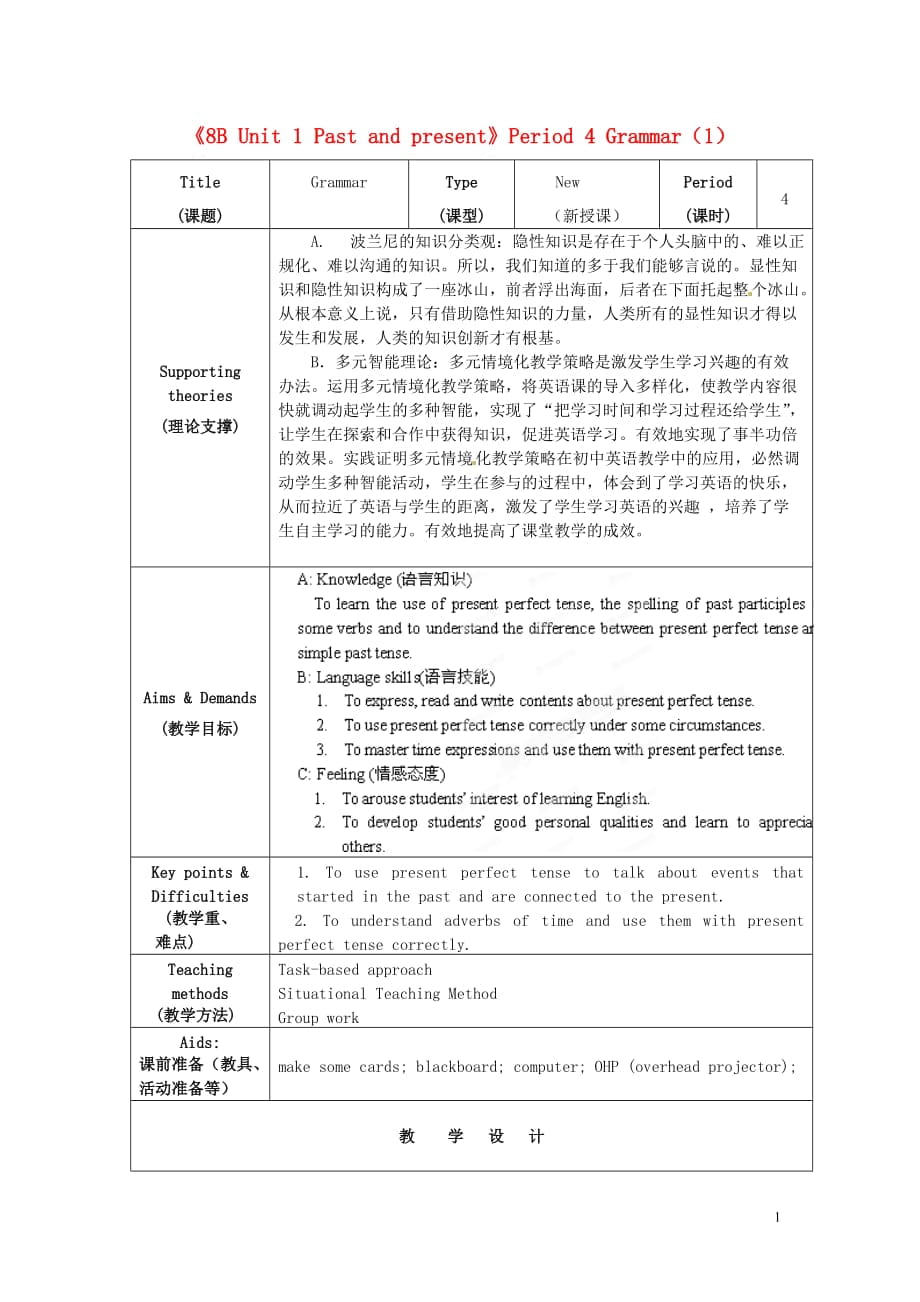《初級(jí)中學(xué)八年級(jí)英語下冊《8B Unit 1 Past and present》Period 4 Grammar(1)教案 牛津版》由會(huì)員分享����,可在線閱讀,更多相關(guān)《初級(jí)中學(xué)八年級(jí)英語下冊《8B Unit 1 Past and present》Period 4 Grammar(1)教案 牛津版(4頁珍藏版)》請?jiān)谘b配圖網(wǎng)上搜索����。
1����、
《8B Unit 1 Past and present》Period 4 Grammar(1)
Title
(課題)
Grammar
Type
(課型)
New
(新授課)
Period
(課時(shí))
4
Supporting
theories
(理論支撐)
A. 波蘭尼的知識(shí)分類觀:隱性知識(shí)是存在于個(gè)人頭腦中的����、難以正規(guī)化、難以溝通的知識(shí)����。所以,我們知道的多于我們能夠言說的����。顯性知識(shí)和隱性知識(shí)構(gòu)成了一座冰山,前者浮出海面����,后者在下面托起整個(gè)冰山。從根本意義上說����,只有借助隱性知識(shí)的力量,人類所有的顯性知識(shí)才得以發(fā)生和發(fā)展����,人類的知識(shí)創(chuàng)新才有根基����。
B.多元智能理論
2����、:多元情境化教學(xué)策略是激發(fā)學(xué)生學(xué)習(xí)興趣的有效辦法。運(yùn)用多元情境化教學(xué)策略����,將英語課的導(dǎo)入多樣化,使教學(xué)內(nèi)容很快就調(diào)動(dòng)起學(xué)生的多種智能����,實(shí)現(xiàn)了“把學(xué)習(xí)時(shí)間和學(xué)習(xí)過程還給學(xué)生”,讓學(xué)生在探索和合作中獲得知識(shí)����,促進(jìn)英語學(xué)習(xí)����。有效地實(shí)現(xiàn)了事半功倍的效果。實(shí)踐證明多元情境化教學(xué)策略在初中英語教學(xué)中的應(yīng)用����,必然調(diào)動(dòng)學(xué)生多種智能活動(dòng)����,學(xué)生在參與的過程中����,體會(huì)到了學(xué)習(xí)英語的快樂,從而拉近了英語與學(xué)生的距離����,激發(fā)了學(xué)生學(xué)習(xí)英語的興趣,培養(yǎng)了學(xué)生自主學(xué)習(xí)的能力����。有效地提高了課堂教學(xué)的成效。
Aims & Demands
(教學(xué)目標(biāo))
Key points & Difficulties
(教學(xué)重����、
3、
難點(diǎn))
1. To use present perfect tense to talk about events that started in the past and are connected to the present.
2. To understand adverbs of time and use them with present perfect tense correctly.
Teaching methods
(教學(xué)方法)
Task-based approach
Situational Teaching Method
Group work
Aids:
4����、
課前準(zhǔn)備(教具、活動(dòng)準(zhǔn)備等)
make some cards; blackboard; computer; OHP (overhead projector);
教 學(xué) 設(shè) 計(jì)
課前延伸
1. Preview the new words of this part and try to master the usage of them.
2. Try to do some exercises of this part.
通過課前預(yù)習(xí)����,寫下不明白的問題����,以備上課時(shí)搞懂
Teaching Plan
(授課計(jì)劃)
Studying Plan
(學(xué)習(xí)計(jì)劃)
Aim
5����、s
(設(shè)計(jì)意圖)
課
內(nèi)
探
究
學(xué)
Step One
Warm up
1. To listen to music ‘you and me’
2. Check the preview work in groups.
通過音樂以激發(fā)學(xué)生興趣,提高學(xué)生的聽力����,利于提高學(xué)生的口語表達(dá)能力。
Step Two
Presentation
1. Present the patterns and work out the rule.
Eddie has lived with Mill
6����、ie since he was born.
I have lived with my parents for 14 years….
Subject+ ’have’/’has’ +past participle (+others)
2. Description.
Ask the students to describe the pictures using the structure above.
They have finished their homework. /
My parents have not come back yet. /You have not visited
7、me for a long time….
3. Past participles of some verbs
Past participles of most verbs and irregular verbs.
visit-visited come-come…
4. Questions and answers
-Have you studied English for 14 years?
-No, I haven’t.
-Has she traveled to Shanghai recently?
-Yes, he has.
…
5.Time expressions w
8����、ith present perfect tense
Make sentences with these time expressions as follows: already, ever, for…, just, never, since, yet, recently
巧用圖片,呈現(xiàn)新語法結(jié)構(gòu),激起學(xué)生的學(xué)習(xí)熱情����,避免語法課的枯燥無趣����。
通過呈現(xiàn)句子����,幫助學(xué)生總結(jié)語法結(jié)構(gòu)����,讓學(xué)生在學(xué)中練,練中學(xué)����。
學(xué)生選取喜歡的圖片小組討論,創(chuàng)造性地造出一些有趣的句子����,培養(yǎng)團(tuán)隊(duì)精神。
導(dǎo)
Step Three
Practice
1. 用正確的時(shí)態(tài)完成句子
2. 選擇正確的時(shí)間表達(dá)詞匯填
9����、空
通過專項(xiàng)練習(xí)并配以技能教授,加深對(duì)現(xiàn)在完成時(shí)的理解����。
采用小組合作探究的形式進(jìn)行,有利于降低難度����,培養(yǎng)合作精神����。
練
Step Four
Production
Through games to test whether the students have mastered present perfect tense.
Subject on group1’s card; verb on group2’s card; the object or adverb on the group3’s card; time adverb on group4’s card. One s
10����、tudent in group 1 reads subject, the other 3 groups should read relevant contents. If they can do it successfully, they have mastered it.
通過游戲的形式檢測學(xué)生對(duì)現(xiàn)在完成時(shí)的掌握程度,檢查學(xué)生對(duì)與現(xiàn)在完成時(shí)有關(guān)的時(shí)間狀語的理解����。
課
后
提
升
Step Five Assignment
1. Finish the exercises on the paper.
2. Make sentences with present perfect tense.
3. Preview the part of‘Integrated skills ’
減負(fù)增效,強(qiáng)化雙基����,重視能力。
4
 初級(jí)中學(xué)八年級(jí)英語下冊《8B Unit 1 Past and present》Period 4 Grammar(1)教案 牛津版
初級(jí)中學(xué)八年級(jí)英語下冊《8B Unit 1 Past and present》Period 4 Grammar(1)教案 牛津版

